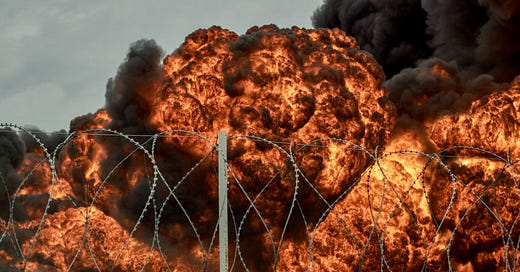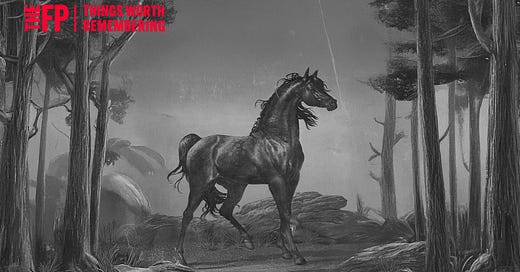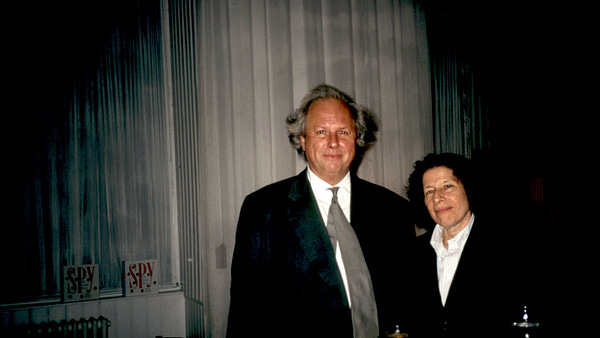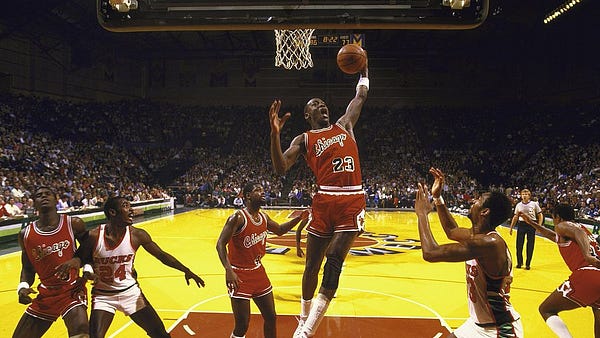
The Free Press

Peter Turchin is not like most historians. For starters, he has an unusual background as an evolutionary biologist studying lemmings and mice. He says that analyzing the complexities of the natural world has allowed him to understand the most complex system of all: human society. He has pioneered a field of history that he calls cliodynamics that applies hundreds of thousands, maybe millions, of historical data points to a mathematical model in order to understand the present and to predict future trends.
Using these tools, Peter and his team published an article in the journal Nature in 2010 that made a bold prediction. They said that economic, social, and political instability in the United States would hit a “peak” in or around the year 2020. Many of Turchin’s critics said he was crazy to make such a speculation, that it’s too hard to predict how history will progress, that the study of history is more art than science.
Then came 2020.
It turned out to be a massively turbulent year, one that brought outbreaks of political violence the U.S. hadn’t experienced in decades. It felt like complete chaos, between Covid lockdowns, mask and vaccine protests, BLM riots, and then, only six days into 2021, the storming of the Capitol in Washington, D.C.
What did Peter see that everyone else missed?
Peter is the author of over 200 articles and eight books, and his fascinating new one is called End Times: Elites, Counter-Elites, and the Path of Political Disintegration. It argues that societies operate cyclically, going through golden ages and end times. And he says that we’re currently looking at the telltale signs of an imminent revolution.
On this episode of Honestly, Peter talks to us about how he studies history, what American history can tell us about our current moment, and why 2024 is going to be a year to watch.
Click below to listen to our conversation, or read this excerpt. See you in the comments. —BW
On predicting 2020:
BW: In 2010, you published an article that predicted that 2020 would be a year of instability, using hundreds of thousands of historical data points. The listener doesn’t need a reminder of the events of that turbulent year, but it was indeed an instability spike. How did you see that coming?
PT: I’d been studying past societies and found that they always get into these “end times.” It happened to recur periodically, and not terribly perfectly or mathematically, but there was something that drove societies into social turbulence and political disintegration. I had been staying away from the present because I didn’t want to get into politics. But I was giving talks about the seventeenth-century crisis, the age of revolutions, things like that, and people kept asking me, “Well, where are we?” And so I decided to look at where we are. This is not a very simple process. The theory is based on quite massive amounts of data. So it took me a couple of years to gather together the database for which I could actually perceive the trends. And what I found truthfully shocked me because I saw our society well on the road to crisis. Of course, our society is quite different from ancient Rome or medieval France and even pre-Civil War United States. But at a more abstract level, the drivers of instability were already working full throttle. So that was one of the reasons why I decided to publish this forecast. And I just want to emphasize that I’m not a prophet. This was a scientific prediction.
BW: What was the reaction when you predicted that?
PT: There was, frankly, disbelief, and it was tinged with a desire to think that I must be wrong because nobody wants to believe in bad predictions. People like Steven Pinker and Max Rosen were making all of these rosy predictions right around the same time. Those predictions were very popular because everybody wants to think there is going to be a happy ending to this story. So, the reaction to my prediction was negative, but it was fine because I had tenure at that point. One of the advantages of American academics is that once you have tenure, you can actually try dangerous, risky, intellectual strategies. And it was really quite remarkable. It was thrilling.
Why elite overproduction is a predictor of crisis:
BW: You write in your book that a handful of factors are the harbingers of end times or societal crisis, one of which is something you call “elite overproduction.” What is that?
PT: Elite overproduction turns out to be the best predictor of a crisis to come. It is essentially ubiquitous in the pre-crisis periods of all societies. I used the game of musical chairs to illustrate it, except in the usual game, you start with 11 players and ten chairs, and one person loses. Here, instead of removing chairs, you keep chairs constant, and we add more players. You can imagine the amount of chaos that is going to happen. Now let’s connect this to the overproduction of wealthy people in the United States. As more and more of them become players in politics, they drive up the price of getting into office. And more importantly, the more people are vying for these positions, the more people are going to be frustrated. They’re going to be losers. But humans don’t have to follow rules. This is the dark side of competition: if it’s too extreme, it creates conditions for people to start to break rules. This is why 2016 was such a revelation, because in spring 2016, we had 17 major Republican candidates in the presidential primaries. And because there was such intense competition, there was a lot of incentive for people to start breaking rules. And we saw that one individual in particular was very good at breaking rules and was getting ahead, so others started to imitate him.
Responding to criticism:
BW: Your idea is that history moves in cycles, and that we’re like a snowball rolling down a hill right now, headed off a cliff. How do you respond to the Steven Pinkers of the world who have a more linear idea of history, that the arc of history is long, but it bends toward progress? They point to data to say, look at all of these economic metrics. Standards of living are at an all-time high. We’re not in poverty. We don’t die from a snakebite on the Oregon Trail, or whatever example you want to use. How do you respond to that view of things?
PT: I actually don’t argue against it. Both are happening. There is undeniable progress. Our economies are much more productive than 100 years ago or 200 years ago. However, it doesn’t mean that just because over the past 5,000 years things have been getting better, they’re going to get better in the next ten years. These are not precise mathematical cycles. These are more like booms and busts. And unfortunately, we are right now in a bust situation. So shouldn’t we learn how we can smooth out those busts? Because in the majority of cases, these enzymes end up in revolutions of civil wars that kill hundreds, or sometimes tens of millions of people, like what happened in China in the nineteenth century. So don’t you want to find out how we avoid those terrible outcomes?
BW: Yes, I would like to find out how to avoid it, because frankly, when I’m reading your book and I’m encountering your ideas, the core idea here is that history is an inevitable cycle, and that depresses me. The message I think it conveys is that we’re just victims of the moment and the time that we live in, and there’s not much we can do about it.
PT: But that’s not my message at all. I’m an optimist by nature. By understanding why these end times happen, we can socially engineer ourselves out of them.
BW: So if those of us who love this country and don’t want us to be in a doom spiral want to know from you how do we change our trajectory when we have an elite that many people view as corrupt and unrepresentative, what would you say? Because in your book you say that one of two groups is going to lead the charge against this current elite establishment—either immiserated, noncredentialed working class, which is a jargony way of saying carpenters or truck drivers, or it’ll be frustrated aspirants within the credentialed class—like young people with great SAT scores that are denied admissions to elite universities. And you say that this first group—the carpenters, the plumbers—are going to fail because there’s a lack of effective organization among them. But the latter group, these frustrated excess elites, are going to be the ones to lead the charge for change. Do I have that right, and tell me how that will work?
PT: Yes, you’re quite right. And that’s because we have large historical material. You see that if elites are unified and the state is strong, then popular uprisings always fail. Just think about the Jacquerie in France or many other such uprisings, and they were all killed and dispersed. So why do we need the elites? Because any kind of action, especially good action that results in good outcomes, is the result of organized action by many people cohering in social movements, parties, or some organizations that have set goals. And then they work in a very disciplined manner to achieve those goals and persuade the rest of the society to follow their lead. That is how positive change occurs in human societies.
On counter-elites:
BW: The subtitle of your book contains the word counter-elites. Explain the difference between the elites and the counter-elites, and how people should know which one they’re dealing with.
PT: There are more elite wannabes than there are positions. So some of those elite wannabes are frustrated elites. Some just accept the situation and go back to carpentry or whatever, but a proportion of them are driven by a sense of injustice. They decide to take alternative ways. By the way, Bari, you are a counter-elite.
BW: Are there counter-elites that are inside the establishment institutions? For example, would J.D. Vance, who ran on a very populist platform to become senator in Ohio, be considered a counter-elite inside the Senate?
PT: So some counter-elites become revolutionaries and want to violently overthrow the regime. Other individuals become dissident elites. They want to work within the system to try to change it. So I see J.D. Vance at this point, and if you look at the left part of the spectrum, Bernie Sanders, as dissident elites. And dissident elites are usually better because counter-elites usually use violence or propose violent solutions.
BW: To be clear, I’m a nonviolent counter-elite. I do not think I have the revolutionary spirit.
PT: Right. So you are a dissident, then?
BW: Well, I don’t know. We have disaffected elites, counter-elites, dissident elites. . . it all gets a little bit confusing.
PT: I understand, but human societies are complex. And so I would not be giving justice by trying to boil things down to just one or two major points.
BW: Peter, why would anyone choose to be a counter-elite when all of the incentives are there to at least aspire to become part of the normal elite? Like what lies on the side of counter-elite is social suicide, career suicide, getting tagged as all kinds of bad words. . . . So what will incentivize elite aspirants to flip and join the counter-elite side?
PT: I’ll give you two reasons. First of all, being a counter-elite is a high-risk but high potential gain strategy. As somebody said, a successful revolution is ten thousand new jobs for revolutionaries. So if you’re beating your head against the wall and you see millions of other people who cannot get into positions and your chances of trying to get into the establishment is zero, then maybe even a small chance of a successful revolution may be worth it. The second driving reason is that in these “end times,” the sense of injustice is palpable. It is not right that the majority of the population is losing ground—even many of the wealthy don’t think that’s right. So young individuals coming from very elite backgrounds could be motivated by trying to change the system for the better. Many of those individuals start by trying to do good, but then because they don’t get anywhere, they turn to violence. So this is a slippery road where you can travel all the way to becoming a violent revolutionary and a violent radical.
On how to change the trajectory:
BW: For those listening who feel like, oh God, what do I do about all of this? I don’t want to live in end times.
PT: Organize.
BW: Organize how?
PT: So people who have no power, what we can do is start organizing as a social movement. And again, this would require leaders. So somebody would have to step forward and try to start doing this. So, for example, the New Deal didn’t happen in isolation. There was a period preceding it called the Progressive Era. And the Progressive Era saw a pretty broad-based social movement, mainly young professionals. So not necessarily working class, but people who were low-rank elites at best and maybe even not elites at all. So that’s one thing. But also what’s going to happen is that if the instability continues to increase, then eventually the governing units understand that things are not going to always go the way they want. They become frightened, essentially, and that helps them to sharpen their minds to start looking for nonviolent solutions.
On what’s in store in 2024:
BW: Peter, I know you’re not a prophet, but you did predict the insane chaos of 2020. What do you think the headlines will be ten years from now? And if that feels like too much of a ridiculous prediction, how does your understanding and your theory of history inform the way that you think the next few years, or perhaps next presidential election, will play out?
PT: I’m very worried about 2024, because you now have two parties that say that they will not accept the win of another party. That rhetoric is growing. What precedes actual violence is violent rhetoric. So 2024 is going to be a really high probability break point. Typically periods of heightened instability take many years, somewhere between 10 and 20 years. So what I hope is that in 2035, the headlines would be that we managed to get the worker wages to grow, and the economy is finally growing in a sustainable way. That’s one possible outcome. The other possible outcome is the previous decade was so horrible, everybody became tired of violence, so nobody wants to start violence again. But when the new generation comes along, they will again have the same type of turbulence happen. And I’m sorry if I’m not making a clear case, but that’s because our future is unpredictable. It really depends on us collectively. You can actually contribute quite a lot by putting the right ideas out and helping people make better choices. You, Bari, can make a difference. I can also hopefully make a difference by making science better so we can use it to understand history better. So perhaps rather than setting a goal of how we can solve everything in one year, we should think about how we can start making small steps.
To support vital conversation, become a Free Press subscriber today:















https://www.c-span.org/video/?536106-2/open-forum
The high school and college students that I know are bitter about the Covid shut downs that deprived them of normal socializing and education. They are incensed to think that they can't afford a house or earn an income to support a family. They do not see the American Dream in their future.